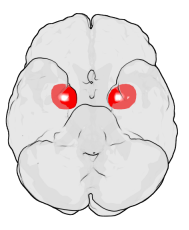
Photo from wikipedia
Cholinergic muscarinic stimulation of vast areas of the limbic brain induced a well-documented polydipsia in laboratory rats. This excessive water-drinking behavior has not received any convincing biological and physiological interpretation… Click to show full abstract
Cholinergic muscarinic stimulation of vast areas of the limbic brain induced a well-documented polydipsia in laboratory rats. This excessive water-drinking behavior has not received any convincing biological and physiological interpretation for the last 50 years. This review offers such an interpretation and suggests that cholinergically induced drinking response, mostly by carbachol, is associated with activation of the ascending mesolimbic cholinergic system that serves for initiation of emotional aversive arousal of the organism. The ascending cholinergic system originates from the laterodorsal tegmental nucleus, has a diffuse nature, and affects numerous subcortical limbic structures. It is proposed that the carbachol-induced drinking response is related to the state of anxiety and does not serve the regulation of thirst. Instead, the response is anxiety-induced polydipsia that might occur as a soothing procedure that decreases the aversiveness of the negative emotional state induced by carbachol. It is concluded that carbachol-induced water-drinking behavior is a rewarding process that contributes to alleviating the feeling of anxiety by bringing some relief from the cholinergically induced aversive state, and it is a homologue to anxiety-driven polydipsia in humans.
Journal Title: Brain Sciences
Year Published: 2022
Link to full text (if available)
Share on Social Media: Sign Up to like & get
recommendations!